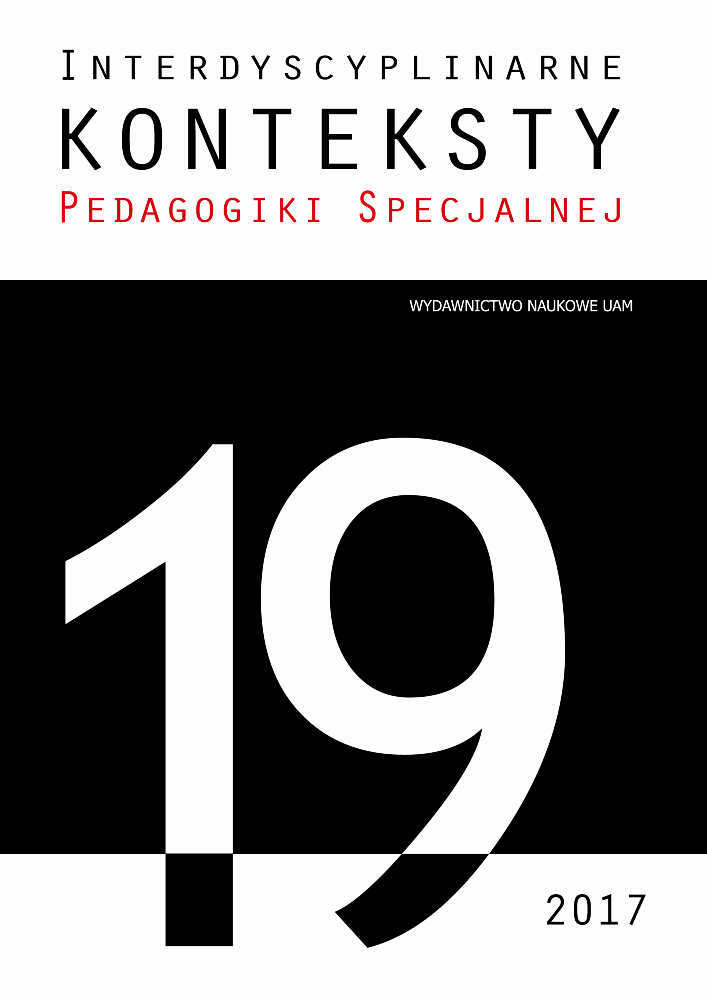Abstrakt
The aim of the research presented in this article was to determine the level of parental stress among mothers of autistic children. Thirty-nine mothers of autistic children, forty mothers of children with Down syndrome as well as forty mothers of children with developing normally took part in the study. We used the Questionnaire on Resources and Stress (QRS, designed by J. Holroyd) to assess the parental stress among families of developmentally delayed children or children with intellectual disabilities. The results of the study indicate that, comparing to mothers of children with Down syndrome and mothers of children developing well, mothers of autistic children are the ones who experience the highest level of parental stress. Potential sources of coping strategies among mothers of children that suffer from autism are associated with relatively low stress levels as a result of disharmony within the family, personal issues, the child’s health situation and financial problems.
Bibliografia
Barlow J., Cullen-Powell L., Cheshire A., The effectiveness of the training and support program for parents of children with disabilities: a randomized controlled trial, “Journal of Psychosomatic Research” 2008, 64.
Benson P.R., The in past of child symptom severity on depressed mood among parents of children with ASD: The mediating role of stress proliferation, “Journal of Autism and Developmental Disorders” 2006, 36.
Brasic J.R., Gianutsos J.G., Neuromotor assessment and autistic disorder, “Autism” 2000, 4.
Burnett W.S., Boyce G.C., Effects of children with Down syndrome on parents activitie, “American Journal on Mental Retardation” 1995, 100.
Centers for Disease Control and Prevention. Data& Statistics na: http://www.cdc.gov/ncbddd/autism/data.html [dostęp: 29.06.2014].
Currenti A., Understanding and determining the etiology of autism, “Cellular and Molecural Neurobiology” 2010, vol. 30.
Dąbrowska A., Pisula E., Parenting stress and doping styles in mothers and fathers of preschool
children with autism and Down syndrome, “Journal of Intellectual Disability Research” 2010, 54.
Dodds L. et.al., The role of prenatal, obstetric and neonatal factors in the development of autism, “Journal of Autism and Developmental Disorders” 2011, vol. 41.
Dykens E.M., Toward a positive psychology of mental retardation, “American Journal of Orthopsychiatry” 2006, 76.
Feldman M., McDonald L., Serbin L., Stack D., Secco M.L, Yu, C.T., Predictors of depressive symptoms in primary caregivers of young children with or at risk for developmental delay, “Journal of Intellectual Disability Research” 2007, 51.
Firkowska-Mankiewicz A., Jakość życia rodzin z dzieckiem niepełnosprawnym, „Psychologia Wychowawcza” 1999, 2.
Gretkowski A., Pomoc psychologiczno-pedagogiczna rodzinie i dziecku przewlekle choremu, [w:] Pomoc dziecku i rodzinie w sytuacji kryzysowej, teoria, historia, praktyka, red. I. Kurlak, A. Gretkowski, Wydawnictwo Diecezjalne i Drukarnia w Sandomierzu, Stalowa Wola – Sandomierz 2008.
Hodapp R.M., Ly T.M., Fidler D.J., Ricci L.A., Less stress, more rewarding: parenting children with Down syndrome, “Parenting: Science and Practice” 2001, 1.
Krause A., Dziecko niepełnosprawne w rodzinie w perspektywie zmiany społecznej, [w:] Rodzina osób z niepełnosprawnością intelektualną wobec wyzwań współczesności, red. Z. Żyta, Wydawnictwo Edukacyjne Akapit, Toruń 2010.
Krauss M., Child-related and parenting stress:similarities and differences between mothers and fathers of children with disabilities, “American Journal on Mental Retardation” 1993, t. 97, nr 4.
McConkey R., Truesdale-Kennedy M., The impast on mothers of bringing up a child with intellectual disabilities: a cross-cultural study, „International Journal of nursing Studiem” 2008, 45.
Minczakiewicz E., Sytuacja rodzin z dzieckiem z zespołem Downa na tle sytuacji współczesnych polskich rodzin statystycznych, [w:] Rodzina osób z niepełnosprawnością intelektualną wobec wyzwań współczesności, red. Z. Żyta, Wydawnictwo Edukacyjne Akapit, Toruń 2010.
Parchomiuk M., Rodzice dzieci z mózgowym porażeniem dziecięcym wobec sytuacji trudnych: Wydawnictwo UMCS, Lublin 2007.
Parchomiuk M., Zasoby osobiste matek dzieci niepełnosprawnych. „Człowiek – Niepełnosprawność– Społeczeństwo” 2012, nr 1(15).
Pisula E., Małe dziecko z autyzmem – diagnoza i terapia, Gdańskie Wydawnictwo Psychologiczne, Gdańsk 2005.
Pisula E., Psychologiczne problemy rodziców dzieci z zaburzeniami rozwoju, Wydawnictwo UW, Warszawa 1998.
Pisula E., Samotność wśród najbliższych. Interakcje dzieci z autyzmem z rodzicami, „Czasopismo Psychologiczne” 2009, 15.
Schieve L.A., Blumberg S.J., Rice C., Visser S.N., Boyle C., The relationship between autism and parental stress, “Pediatrics” 2007, 1.
Spratt G., Sayler C.F., Macias M.M., Assessing parenting stress in multiple samples of children with special needs (CSN). Preview, “Families, Systems, Health” 2007, 25.
Tobing L.E., Glenwick D.S., Predictors and moderators of psychological distress in mothers of children with pervasive developmental disorders, “Journal of Family Social Work” 2006, 10.
Waisbren S.E., Parents reactions after the birth of a developmentally disabled child, “American Journal of Mental Deficiency” 1980, 84.
Zaroff C.M., Uhm S.Y., Prevalence of autism spectrum disorders and influence of country of measuremnet and ethnicity. “Social Psychiatry and Psychiatric Epidemiology” 2012, 47(3).
Zasępa E., Poczucie koherencji rodziców dzieci z zaburzeniami rozwoju, [w:] Rodzina osób z niepełnosprawnością intelektualną wobec wyzwań współczesności, red. Z. Żyta, Wydawnictwo Edukacyjne Akapit, Toruń 2010.
Żmijewska A., Zespół Aspergera w ujęciu rodzinnym – przegląd badań, „Psychiatria Polska” 2010, 44.

